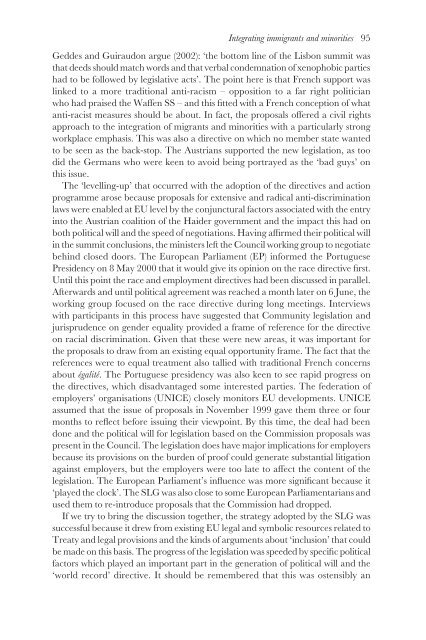Europeanisation, National Identities and Migration ... - europeanization
Europeanisation, National Identities and Migration ... - europeanization
Europeanisation, National Identities and Migration ... - europeanization
Create successful ePaper yourself
Turn your PDF publications into a flip-book with our unique Google optimized e-Paper software.
Integrating immigrants <strong>and</strong> minorities 95<br />
Geddes <strong>and</strong> Guiraudon argue (2002): ‘the bottom line of the Lisbon summit was<br />
that deeds should match words <strong>and</strong> that verbal condemnation of xenophobic parties<br />
had to be followed by legislative acts’. The point here is that French support was<br />
linked to a more traditional anti-racism – opposition to a far right politician<br />
who had praised the Waffen SS – <strong>and</strong> this fitted with a French conception of what<br />
anti-racist measures should be about. In fact, the proposals offered a civil rights<br />
approach to the integration of migrants <strong>and</strong> minorities with a particularly strong<br />
workplace emphasis. This was also a directive on which no member state wanted<br />
to be seen as the back-stop. The Austrians supported the new legislation, as too<br />
did the Germans who were keen to avoid being portrayed as the ‘bad guys’ on<br />
this issue.<br />
The ‘levelling-up’ that occurred with the adoption of the directives <strong>and</strong> action<br />
programme arose because proposals for extensive <strong>and</strong> radical anti-discrimination<br />
laws were enabled at EU level by the conjunctural factors associated with the entry<br />
into the Austrian coalition of the Haider government <strong>and</strong> the impact this had on<br />
both political will <strong>and</strong> the speed of negotiations. Having affirmed their political will<br />
in the summit conclusions, the ministers left the Council working group to negotiate<br />
behind closed doors. The European Parliament (EP) informed the Portuguese<br />
Presidency on 8 May 2000 that it would give its opinion on the race directive first.<br />
Until this point the race <strong>and</strong> employment directives had been discussed in parallel.<br />
Afterwards <strong>and</strong> until political agreement was reached a month later on 6 June, the<br />
working group focused on the race directive during long meetings. Interviews<br />
with participants in this process have suggested that Community legislation <strong>and</strong><br />
jurisprudence on gender equality provided a frame of reference for the directive<br />
on racial discrimination. Given that these were new areas, it was important for<br />
the proposals to draw from an existing equal opportunity frame. The fact that the<br />
references were to equal treatment also tallied with traditional French concerns<br />
about égalité. The Portuguese presidency was also keen to see rapid progress on<br />
the directives, which disadvantaged some interested parties. The federation of<br />
employers’ organisations (UNICE) closely monitors EU developments. UNICE<br />
assumed that the issue of proposals in November 1999 gave them three or four<br />
months to reflect before issuing their viewpoint. By this time, the deal had been<br />
done <strong>and</strong> the political will for legislation based on the Commission proposals was<br />
present in the Council. The legislation does have major implications for employers<br />
because its provisions on the burden of proof could generate substantial litigation<br />
against employers, but the employers were too late to affect the content of the<br />
legislation. The European Parliament’s influence was more significant because it<br />
‘played the clock’. The SLG was also close to some European Parliamentarians <strong>and</strong><br />
used them to re-introduce proposals that the Commission had dropped.<br />
If we try to bring the discussion together, the strategy adopted by the SLG was<br />
successful because it drew from existing EU legal <strong>and</strong> symbolic resources related to<br />
Treaty <strong>and</strong> legal provisions <strong>and</strong> the kinds of arguments about ‘inclusion’ that could<br />
be made on this basis. The progress of the legislation was speeded by specific political<br />
factors which played an important part in the generation of political will <strong>and</strong> the<br />
‘world record’ directive. It should be remembered that this was ostensibly an



